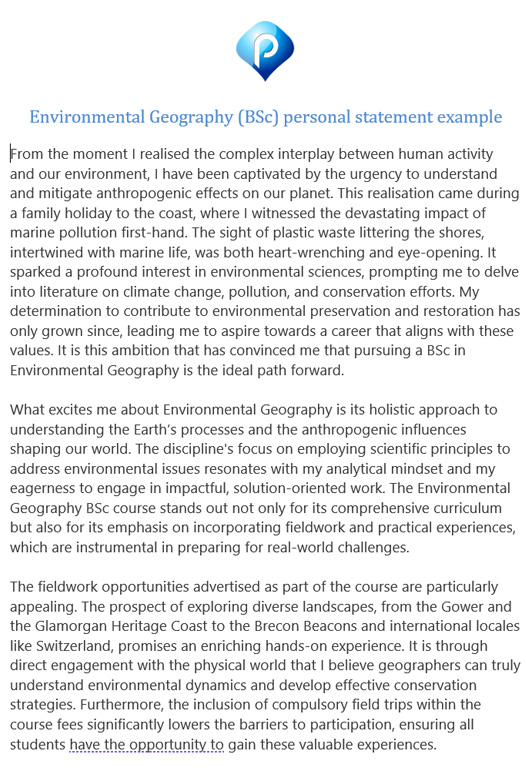- Reading time: 3 minutes
- Price: Free download
- Published: 24th March 2024
- Price: Free download
- Word count: 833 words
- File format: Text
Preview:
From the moment I realised the complex interplay between human activity and our environment, I have been captivated by the urgency to understand and mitigate anthropogenic effects on our planet. This realisation came during a family holiday to the coast, where I witnessed the devastating impact of marine pollution first-hand. The sight of plastic waste littering the shores, intertwined with marine life, was both heart-wrenching and eye-opening. It sparked a profound interest in environmental sciences, prompting me to delve into literature on climate change, pollution, and conservation efforts. My determination to contribute to environmental preservation and restoration has only grown since, leading me to aspire towards a career that aligns with these values. It is this ambition that has convinced me that pursuing a BSc in Environmental Geography is the ideal path forward.
What excites me about Environmental Geography is its holistic approach to understanding the Earth’s processes and the anthropogenic influences shaping our world. The discipline’s focus on employing scientific principles to address environmental issues resonates with my analytical mindset and my eagerness to engage in impactful, solution-oriented work. The Environmental Geography BSc course stands out not only for its comprehensive curriculum but also for its emphasis on incorporating fieldwork and practical experiences, which are instrumental in preparing for real-world challenges.
The fieldwork opportunities advertised as part of the course are particularly appealing. The prospect of exploring diverse landscapes, from the Gower and the Glamorgan Heritage Coast to the Brecon Beacons and international locales like Switzerland, promises an enriching hands-on experience. It is through direct engagement with the physical world that I believe geographers can truly understand environmental dynamics and develop effective conservation strategies. Furthermore, the inclusion of compulsory field trips within the course fees significantly lowers the barriers to participation, ensuring all students have the opportunity to gain these valuable experiences.
Another crucial aspect of the course that influenced my decision is the proximity to cutting-edge technologies and high-quality facilities. The availability of the latest surveying and mapping equipment, along with advanced labs and computing facilities, is vital for fostering a deep understanding of geographic information systems (GIS) and remote sensing technologies. Mastery of these tools is essential for conducting effective environmental analysis and proposing evidence-based solutions to contemporary issues.
The flexibility of the Environmental Geography program is also highly appealing. The option to switch to programs incorporating a professional placement year or a year of study abroad offers the chance to gain international perspective and practical experience in the field. Such experiences not only enhance learning but also significantly improve employability upon graduation.
My academic background has laid a strong foundation for this course. Subjects like Biology and Geography have equipped me with a broad understanding of ecological systems, the significance of biodiversity, and the fundamentals of human-environment interactions. Projects, such as a comprehensive study on the impact of urbanisation on local ecosystems, have honed my research, analysis, and problem-solving skills. These experiences have instilled in me a scientific curiosity and a methodological approach to inquiry, both of which are essential for a successful career in environmental geography.
Outside the classroom, my commitment to environmental stewardship has translated into active participation in a variety of local conservation initiatives. These have included not only beach clean-ups and tree-planting activities but also engagements in recycling campaigns and educational workshops on sustainable living practices. Participating in these activities has significantly deepened my appreciation for nature and highlighted the critical role of community engagement in combating environmental degradation. For instance, leading a community project that focused on installing rain gardens in urban areas to manage stormwater runoff offered me firsthand experience in practical environmental problem-solving and the importance of green infrastructure. Furthermore, volunteering with a local wildlife conservation group, where I contributed to habitat restoration projects for endangered species, allowed me to understand the delicate balance of ecosystems and the intricate challenges posed by human encroachment. These experiences have not only provided me with a broader perspective on the spectrum of environmental stewardship but have also underscored the multifaceted approach needed to address the environmental crises we face. They have imbued me with a profound sense of responsibility and a fervent desire to play an instrumental role in advancing sustainable development.
Looking towards the future, I am ambitious about shaping a career that centres on mitigating the adverse effects of climate change and promoting environmental sustainability. I aspire to work with international environmental organisations, contributing to global conservation efforts and policy-making processes that aim to preserve our planet for future generations. Enrolling in the Environmental Geography BSc course is a crucial step towards realising this ambition, providing the knowledge, skills, and practical experience necessary to make a meaningful impact in the field.
In conclusion, my passion for the environment, combined with my academic background and extracurricular experiences, makes me a strong candidate for the Environmental Geography BSc programme. I am eager to leverage this course as a springboard to launch a career dedicated to protecting and restoring our planet’s natural beauty and biodiversity.
Related personal statements:
- Chemistry BSc (Hons) Personal Statement Example
- Physics BSc (Hons) Personal Statement
- Zoology BSc Personal Statement Example
- Forensic Science BSc (Hons) Personal Statement
- Environmental Science BSc personal statement example
- Chemical Engineering BSc Personal Statement Example
- Biotechnology BSc Personal Statement Example
- Biochemistry personal statement example
- Biomedical engineering program personal statement example
- Bioengineering Personal Statement Example
Review this personal statement:
Latest reviews:
Helpful example
Thank you for posting this, there are not many examples for this subject so I found it extremely helpful to have a starting point.
